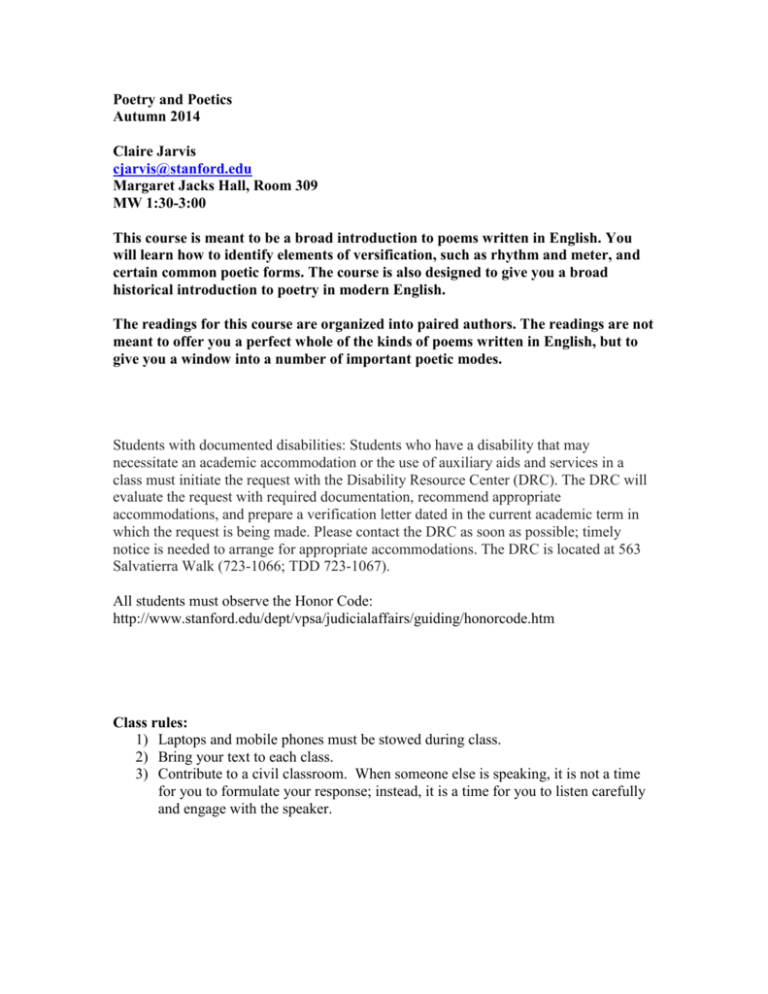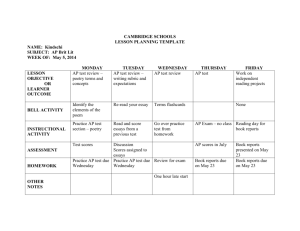Syllabus
advertisement

Poetry and Poetics Autumn 2014 Claire Jarvis cjarvis@stanford.edu Margaret Jacks Hall, Room 309 MW 1:30-3:00 This course is meant to be a broad introduction to poems written in English. You will learn how to identify elements of versification, such as rhythm and meter, and certain common poetic forms. The course is also designed to give you a broad historical introduction to poetry in modern English. The readings for this course are organized into paired authors. The readings are not meant to offer you a perfect whole of the kinds of poems written in English, but to give you a window into a number of important poetic modes. Students with documented disabilities: Students who have a disability that may necessitate an academic accommodation or the use of auxiliary aids and services in a class must initiate the request with the Disability Resource Center (DRC). The DRC will evaluate the request with required documentation, recommend appropriate accommodations, and prepare a verification letter dated in the current academic term in which the request is being made. Please contact the DRC as soon as possible; timely notice is needed to arrange for appropriate accommodations. The DRC is located at 563 Salvatierra Walk (723-1066; TDD 723-1067). All students must observe the Honor Code: http://www.stanford.edu/dept/vpsa/judicialaffairs/guiding/honorcode.htm Class rules: 1) Laptops and mobile phones must be stowed during class. 2) Bring your text to each class. 3) Contribute to a civil classroom. When someone else is speaking, it is not a time for you to formulate your response; instead, it is a time for you to listen carefully and engage with the speaker. Course Requirements: Required: The Norton Anthology of Poetry, Eds. Ferguson, et al. Recommended: The New Princeton Encyclopedia of Poetry and Poetics Resource: http://www.oed.com.ezproxy.stanford.edu/ Evaluation: Participation and attendance (no unexcused absences) (20%) Any weekly short form assignments on meter (recitation, metrical worksheets, imitations, etc.) Two short (5-6 page) paper assignments (20% each), the first due in Week 5, the second in Week 9. Papers are due at the beginning of class on Wednesday. Final Exam (20%) Schedule: Week One: Origins of Modern English Poetry, Sonnets: Monday: Brief lecture introduction. Comparison of Wyatt and Surrey, Petrarchan sonnets, “The Long Love, that in My Thought Doth Harbor,” and “Love, that Doth Reign and Live within My Thought,” p. 126 and 137. Wednesday: Please read the section on versification, lxi-lxxx in your Norton, practice of meter and scansion; William Shakespeare, from Sonnets, 257-269. Sir Thomas Wyatt, “The Long Love, That in My Thought Doth Harbor,” “Whoso List to Hunt,” “My Galley,” “They Flee from Me;” the case of Southwell’s “The Burning Babe.” Week Two: The Sonnet, The metaphysicals Monday: Wyatt and Shakespeare, contd., Sir Philip Sidney, all the poems from Astrophil and Stella, 213-220; Edmund Spenser, from Amoretti, 190-193. Wednesday: John Donne, 293-322, and Andrew Marvell, “To His Coy Mistress,” “The Mower against Gardens,” “The Mower to the Glowworms,” “The Garden,” “An Horatian Ode.” Week Three: The Cavaliers and the Graveyard Poets Monday: Ben Johnson, 323-333, and Robert Herrick, 354-363. Wednesday: Thomas Gray, “Elegy Written in a Country Churchyard,” 669, and William Cowper, “The Castaway.” Week Four: Romantic Poetry Monday: William Blake, from Songs of Innocence and from Songs of Experience; John Keats, “On First Looking into Chapman’s Homer,” “When I have Fears,” “To Homer,” “The Eve of St. Agnes,” La Belle Dame sans Merci,” “Ode to Psyche,” “Ode to a Nightingale,” “Ode on Melancholy,” Ode on a Grecian Urn,” “To Autumn,” “Bright Star,” “This Living Hand.” (Christopher Smart) Wednesday: William Wordsworth, “Lines,” “The Ruined Cottage,” “She Dwelt among the Untrodden Ways,” “Three Years She Grew,” “It Is a Beauteous Evening,” “London, 1802,” “Composed upon Westminster Bridge, September 3, 1802,” “My Heart Leaps Up,” “Ode,” “I Wandered Lonely as a Cloud,” “She was a Phantom of Delight,” “The World is Too Much with Us,” “The Solitary Reaper,” “Surprised by Joy,” “Mutability,” “Scorn not the Sonnet;” Samuel Taylor Coleridge “This Lime-Tree Bower My Prison,” “Kubla Khan,” “Frost at Midnight,” “The Rime of the Ancient Mariner,” “Dejection.” Week Five: Victorian Poetry FIRST PAPER DUE ON WEDNESDAY Monday: Alfred, Lord Tennyson “Mariana,” “The Kraken,” “The Lady of Shalott,” “The Lotos-Eaters,” “Ulysses,” “Break, Break, Break,” from In Memoriam A.H.H., “The Charge of the Light Brigade,” “Tithonus,” “‘Frater Ave atque Vale,’” “Crossing the Bar;” Robert Browning “Porphyria’s Lover,” “My Last Duchess,” ““Childe Roland to the Dark Tower Came,”” “Fra Lippo Lippi,” “Andrea del Sarto.” (E. Brontë) Wednesday: Christina Rossetti “Song,” “Remember,” “In an Artist’s Studio,” “Goblin Market” (on courseworks); Matthew Arnold “Shakespeare,” “To Marguerite,” “The Scholar-Gypsy,” “Thrysis,” “Dover Beach.” Week Six: The American Renaissance Monday: Edgar Allan Poe, “Sonnet—To Science,” “To Helen,” “The Raven,” “Eldorado,” “Annabel Lee;” and Henry Wadsworth Longfellow, from Evangeline, “The Jewish Cemetery at Newport,” from The Song of Hiawatha. (Emerson) Wednesday: Emily Dickinson, 1110-1127 and Walt Whitman, 1060-1086. Week Seven: The Great War and British Modernism Monday: Edward Thomas “Adlestrop,” “The Owl,” “In Memoriam [Easter 1915],” “The Rain,” “As the team’s head brass;” Wilfred Owen, “Anthem for Doomed Youth,” “Dulce Et Decorum Est,” “Insensibility,” “Strange Meeting,” “Futility.” (T. S. Eliot) Wednesday: William Butler Yeats, “The Lake Isle of Innisfree,” “When You Are Old,” “The Wild Swans at Coole,” “Easter, 1916,” “The Second Coming,” “Sailing to Byzantium,” “Leda and the Swan,” “Among School Children,” “Lapis Lazuli,” “The Circus Animals’ Desertion,” “Under Ben Bulben;” W. H. Auden “Lullaby,” “Spain, 1937,” “As I walked Out One Evening,” “Musée des Beaux Arts,” “In Memory of W. B. Yeats,” “September 1, 1939,” “In Praise of Limestone,” “The Shield of Achilles.” Week Eight: American Modernism and the Harlem Renaissance Monday: Wallace Stevens 1256-1268 and Robert Frost 1227-1244 Wednesday: Jean Toomer 1398-1400 (and courseworks) and Langston Hughes 14291435 (H. Crane) Week Nine: Late Modernism SECOND PAPER DUE WEDNESDAY Monday: Elizabeth Bishop 1515-1527 and Robert Lowell 1592-1605 Wednesday: Philip Larkin 1648-1658 and Frank O’Hara 1728-1730 Week Ten: Poetry Today Rich, Braithwaite, Hill, Komunyakaa, Gluck, Ammons, Carson, Greenlaw (Berryman)





